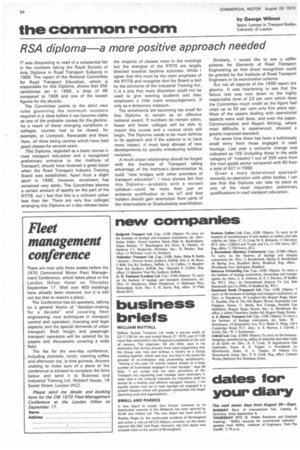the common room
Page 56

If you've noticed an error in this article please click here to report it so we can fix it.
by George Wilmot
Senior Lecturer in Transport Studies, University of London.
RSA diploma a more positive approach needed
IT was disquieting to read of a substantial fall in the numbers taking the Royal Society of Arts Diploma in Road Transport Subjects in 1969. The report of the National Committee for Road Transport Education, which is responsible for this Diploma, shows that 359 candidates sat in 1969, a drop of 68 compared to 1968 and one of the lowest figures for the decade.
The Committee points to the strict new rules governing the minimum numbers required in a class before it can become viable as one of the probable causes for the fiecline. As a result of these changing conditions in colleges, courses had to be closed, for example, at Liverpool, Newcastle and West Ham, all three being centres which have held good classes for several years.
' This Diploma, regarded as a basic course in Toad transport education and a recognized preliminary entrance to the Institute of Transport, should have received a great boost when the Road Transport Industry Training Board was established. Apart from a slight spurt in 1968, however, enrolment has remained very static. The Committee blames a certain amount of apathy on the part of the RTITB, but I feel that this is a criticism rather less than fair. There are very few colleges arranging this Diploma on a day-release basis; the majority of classes meet in the evenings but the energies of the RTITB are largely directed towards daytime activities. While I agree that this must be the main emphasis of the RTITB and recognize that the Board is tied by the strictures of the Industrial Training Act, it is a pity that more discretion could not be used to give evening students and their employers a little more encouragement, if only as a temporary measure.
The enrolments are becoming too small for this Diploma to remain as an effective national award. If numbers do remain static, fewer and fewer colleges will be able to mount this course and a vicious circle will begin. The Diploma needs to be more definite in its approach and if the scheme is to have more impact, it must keep abreast of new developments by quickly introducing syllabus revisions.
A much closer relationship should be forged with the Institute of Transport taking advantage of the Institute's determination to build "new bridges with other providers of transport education". I have always felt that this Diploma--probably with a revised syllabus—could be more than just an entrance qualification to the loT and that holders should gain exemption from parts of the Intermediate or Graduateship examination. Similarly, I would like to see a stiffer scheme for Elements of Road Transport Engineering so that direct recognition could be granted by the Institute of Road Transport Engineers in its examination scheme.
But not all aspects of the 1969 report are gloomy. It was heartening to see that the failure rate was now down to the highly respectable level of 23 per cent which does the Committee much credit as the figure had crept up to 50 per cent only five years ago. Most of the papers dealing with operational aspects were well done, and even the paper, Communication and Report Writing, where most difficulty is experienced, showed a greatly improved standard.
For some time there has been a ludicrously small entry from those engaged in road haulage. Last year a welcome change was indicated as 105 (including those in the wide category of "industry") out of 359 were from the road goods sector compared with 80 from a total of 427 in 1968.
Given a more determined approach towards co-operation with other bodies, I can see that this Diploma can take its place as one of the most important preliminary qualifications in road transport education.
































































































